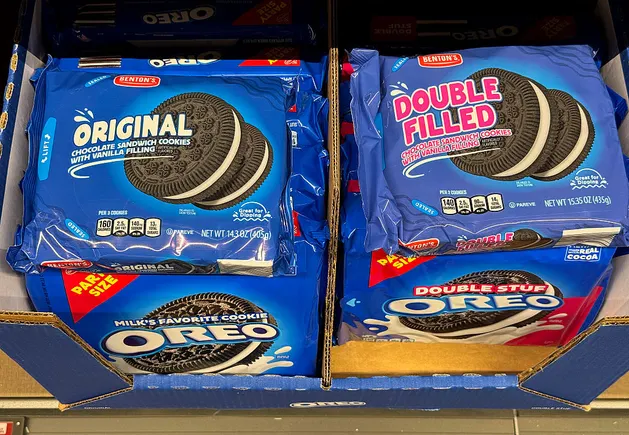As the demand for private label products continues to rise, more CPG manufacturers are expected to take legal action against retailers they believe are producing copycat items.
J.M. Smucker recently filed a lawsuit against Trader Joe’s, claiming that the grocery chain’s crustless PB&J sandwiches are too similar to its Uncrustables frozen sandwiches. This legal action follows Mondelēz International’s lawsuit against Aldi, alleging that the retailer’s snack products mimic the packaging of Oreos, Chips Ahoy!, and other popular brands.
Neil Saunders, managing director at Global Data, stated, “What the national brands are doing is just throwing down a gauntlet and saying, ‘Look, you guys can’t just get away with imitating our product.’ There will likely be more disputes as the market becomes increasingly competitive.”
Private label products, once considered inferior to branded items, have now become strong contenders in the market. They are available in various stores, from small local shops to major retailers like Walmart and Costco, spanning across different product categories such as canned goods, dairy, and frozen foods.
According to GlobalData, private label products are projected to capture over 20% of the food and grocery sales by 2025, a significant increase from 12% two decades ago. In 2024, sales reached a record high of $271 billion, indicating a 3.9% growth compared to a 1% increase in national brand sales.
The growth of private label products can be attributed to retailers investing in improving the quality, taste, and value of their offerings. With inflation affecting consumer spending habits, private label products have become an attractive cost-saving option for shoppers.
‘A game of cat and mouse’
Discount chains, known for avoiding name-brand products, often replicate popular items like Oreo cookies or Uncrustables sandwiches to attract consumers to their own versions. When private label products closely resemble branded items, food manufacturers are more inclined to take legal action.
Mark Simpson, a partner at Saul Ewing specializing in intellectual property, explained, “It’s always been sort of a game of cat and mouse, where some private label retailers try to get as close as they can to branded products.”
Notably, Smucker and Mondelēz targeted retailers that primarily carry private label products in their lawsuits. Major food manufacturers, reliant on larger retailers like Walmart and Kroger, are less likely to sue them due to concerns about damaging long-term relationships.
While Aldi and Trader Joe’s are rapidly growing retailers, they do not contribute significantly to the revenue of major food manufacturers.
Robert Brauneis, a professor at The George Washington University Law School, emphasized, “It’s a lesson that this kind of business model is going to be more susceptible to lawsuits, even if the lawsuits have a questionable basis.”
“What the national brands are doing is just throwing down a gauntlet and saying, ‘Look, you guys can’t just get away with imitating our product’ “

Neil Saunders
Managing Director, Global Data
In their respective lawsuits, Smucker and Mondelēz argued that private label products create confusion among consumers, leading them to believe they are purchasing branded items.
The companies asserted that Trader Joe’s and Aldi benefit unfairly from the reputation and investments made by the food manufacturers to build their brands. Without legal intervention, these imitative products could harm their brands and businesses irreparably.
Lawsuits loaded with risk
Brauneis suggested that the Smucker case is unlikely to be dismissed early on, potentially pressuring Trader Joe’s to settle as the legal proceedings continue.
He added, “Smucker can cause Trader Joe’s some litigation costs, which may influence their decision. There’s no guarantee of winning this case. How much is it worth to sell a product similar to yours?”
Smucker’s lawsuit highlighted the similarities between Uncrustables and Trader Joe’s crustless sandwiches, emphasizing packaging design elements and potential consumer confusion.
A spokesperson from Smucker emphasized the company’s commitment to protecting its brands by monitoring the market actively. They aim to safeguard the trademarked design representing the quality associated with the Uncrustables brand and prevent consumer confusion caused by imitation.
On the other hand, Aldi has faced legal challenges regarding its products even before the dispute with Mondelēz.
In 2021, Marks & Spencer sued Aldi over a cake resembling one of its popular products. After reaching a settlement, the cake’s appearance was modified. Additionally, an Australian court ruled against Aldi for copyright infringement related to a children’s snack packaging design based on a competitor’s brand.
Trader Joe’s and Aldi did not provide comments on the matter.
Brauneis and Saunders highlighted the risks for major food brands if their legal actions fail. A ruling favoring the retailers could encourage more imitations of branded products.
“If they lost the legal case, then that would be a disaster, because it would be open season for everyone else to start doing their own thing,” Saunders cautioned. “There’s actually a lot of risk involved.”
Despite the potential risks, food manufacturers are compelled to defend their brands to prevent further imitations. Neglecting to address such issues could weaken their position in enforcing intellectual property rights against future copycat products.

